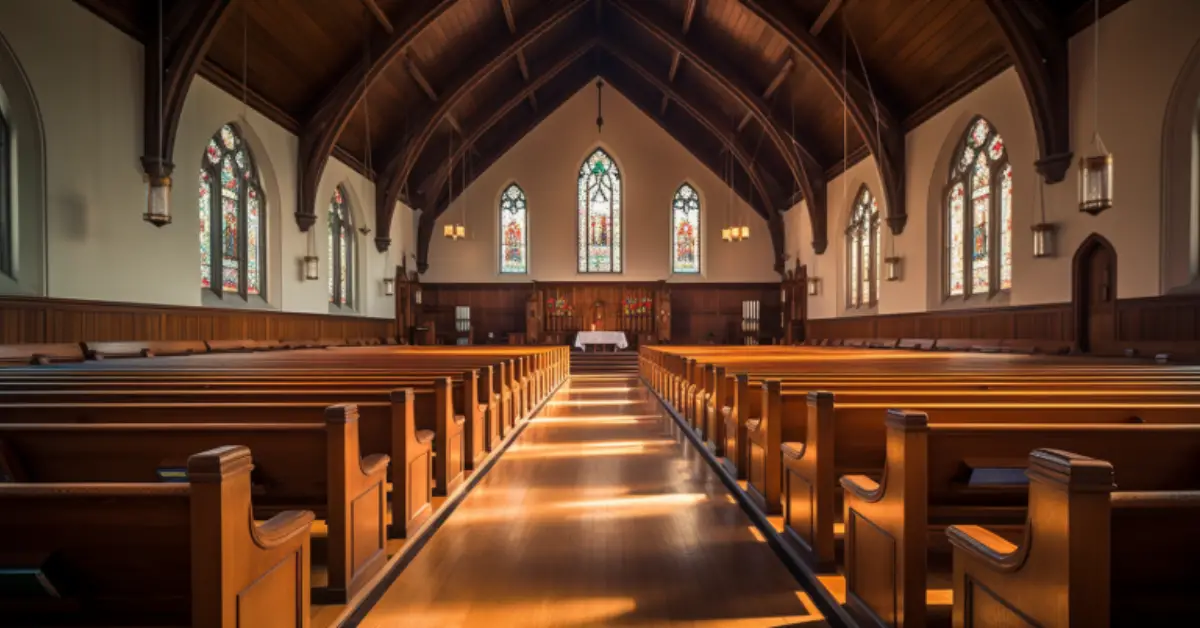The Bible positions the church as a gathering of believers to worship and serve God, emphasizing its role in fostering spiritual growth and community. In the New Testament, the church is a body of believers, united by faith in Jesus, aimed at spreading God’s word and demonstrating His love through actions, serving others, and communal worship. It’s not simply a building or an event; it’s a living, breathing community that’s integral to a Christian’s spiritual journey.
The essence of church goes beyond Sunday services. It’s a hub for support, learning, and love, providing a space to understand God’s view on various aspects of life, navigate through sin and redemption, and strengthen one’s relationship with Jesus.
Curious about the role and significance of the church in Christianity according to the Bible? Dive deeper as we explore biblical truths and insights about the importance, purpose, and functions of the church!
What Does the Bible Say About Church?
The Bible, especially the New Testament, is rich with references to the church, revealing its multifaceted nature and purpose in the lives of believers. It’s not merely a place of worship or a weekly event; it’s a communal entity where believers connect, learn, grow, and serve together.
The church is depicted as the body of Christ, with Jesus as the head. This metaphor illustrates the interconnectedness of believers, each contributing unique gifts and talents to serve the whole. The Apostle Paul, in his letters, emphasized the importance of unity within the church and the shared responsibility of its members to maintain harmony and uphold God’s teachings.
This communal relationship is crucial as it allows believers to encourage one another in faith, offer support during trials, and hold each other accountable in their walk with Jesus. The church also plays a pivotal role in propagating the Gospel and is instrumental in community service, reflecting God’s love and compassion to the world.
In a world marred by sin and struggle, the church stands as a beacon of hope and light, allowing individuals to explore God’s view on morality, purpose, and existence, and find solace and guidance in His word.
Additionally, the church provides a platform for communal worship and prayer, which are fundamental aspects of Christian life. Through corporate worship, believers can experience the presence of God, find encouragement, and gain a deeper understanding of biblical teachings.
Bible Verses About Church
- Matthew 16:18 (NIV) “And I tell you that you are Peter, and on this rock I will build my church, and the gates of Hades will not overcome it.”
- This verse signifies the establishment of the church by Jesus, symbolizing its strength and endurance against evil.
- Hebrews 10:24-25 (NIV) “And let us consider how we may spur one another on toward love and good deeds, not giving up meeting together, as some are in the habit of doing, but encouraging one another—and all the more as you see the Day approaching.”
- This passage underscores the importance of gathering together, encouraging one another in love, and performing good deeds.
- 1 Corinthians 12:27 (NIV) “Now you are the body of Christ, and each one of you is a part of it.”
- Here, believers are reminded that they are integral parts of the body of Christ, each playing a significant role in the church.
- Ephesians 2:19-22 (NIV) “Consequently, you are no longer foreigners and strangers, but fellow citizens with God’s people and also members of his household, built on the foundation of the apostles and prophets, with Christ Jesus himself as the chief cornerstone.”
- This portrays the church as a spiritual household, with Jesus as the cornerstone, and believers as members of God’s family.
- Colossians 3:16 (NIV) “Let the message of Christ dwell among you richly as you teach and admonish one another with all wisdom through psalms, hymns, and songs from the Spirit, singing to God with gratitude in your hearts.”
- This verse emphasizes the role of the church in teaching and admonishing one another, and in collective worship and thanksgiving.
- Acts 2:42 (NIV) “They devoted themselves to the apostles’ teaching and to fellowship, to the breaking of bread and to prayer.”
- This illustrates the early church’s commitment to learning, fellowship, communion, and prayer, setting a model for subsequent generations of believers.
- 1 Corinthians 1:2 (NIV) “To the church of God in Corinth, to those sanctified in Christ Jesus and called to be his holy people, together with all those everywhere who call on the name of our Lord Jesus Christ—their Lord and ours.”
- This addresses the universal church, comprising all who call on the name of Jesus, emphasizing the holiness and unity of the believers.
- Revelation 2-3 (NIV)
- The letters to the seven churches in these chapters convey Jesus’ messages to different churches, addressing their strengths, weaknesses, and the need for repentance and perseverance.
- Romans 12:5 (NIV) “So in Christ we, though many, form one body, and each member belongs to all the others.”
- This verse underscores the unity and mutual belongingness of believers in the body of Christ.
- Ephesians 5:25-27 (NIV) “Husbands, love your wives, just as Christ loved the church and gave himself up for her to make her holy, cleansing her by the washing with water through the word, and to present her to himself as a radiant church, without stain or wrinkle or any other blemish, but holy and blameless.”
- This allegorically depicts Jesus’ love for the church, his self-sacrifice, and the sanctification and purification of the church through His word.
Each of these verses unveils a facet of the church’s divine design, reflecting its essence as a community of believers bound by faith and love, called to reflect God’s glory and to live in harmony and holiness.


